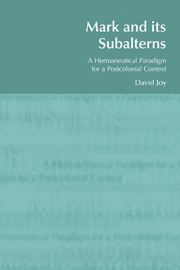Foreword
Summary
Mark and its Subtalterns: A Hermeneutical Paradigm for a Postcolonial Context
I am delighted to offer a brief word of praise and commendation to the author of this most impressive piece of work. David Joy and I first met when he came to the UK to undertake doctoral studies in Birmingham. He immediately made an instant impact upon the scholarly community in Birmingham, due to his restless intellectual curiosity, affable nature and tremendous capacity for dialogue and critical and yet mutual conversation. David became a regular attendee of the monthly Black Theology Forum chaired by myself, which meets at the Queens Foundation for Ecumenical Theological Education in Birmingham. David impressed many of us as a “star in the making” and so it is with much joy and satisfaction that I am able to introduce this seminal text to the wider scholarly world.
It is often said that poor, postcolonial subjects who self-declare themselves as Christians and as followers of Jesus the Christ, are always prone to do two things, whatever the sceptical scholars or doubt-ridden doomsayers will assert: namely (1) they will invariably go to church (no matter what the failings or even the oppressive nature of that church might be) and (2) they will always read the Bible. The final phrase is in italics for I feel it this salient reality that makes David Joy's new text an invaluable resource for all scholars and those in the pastoral and mission work of the church.
- Type
- Chapter
- Information
- Mark and its SubalternsA Hermeneutical Paradigm for a Postcolonial Context, pp. xi - xivPublisher: Acumen PublishingPrint publication year: 2008

